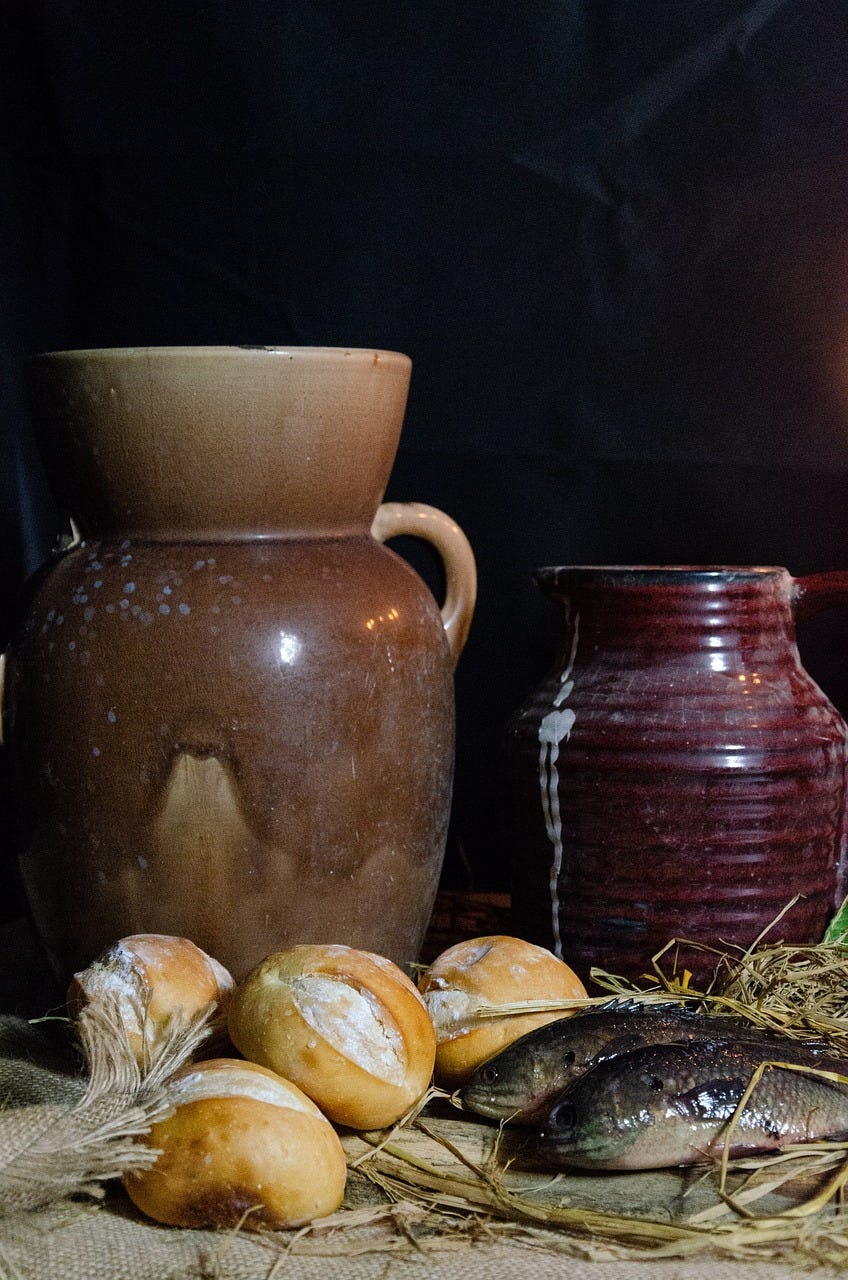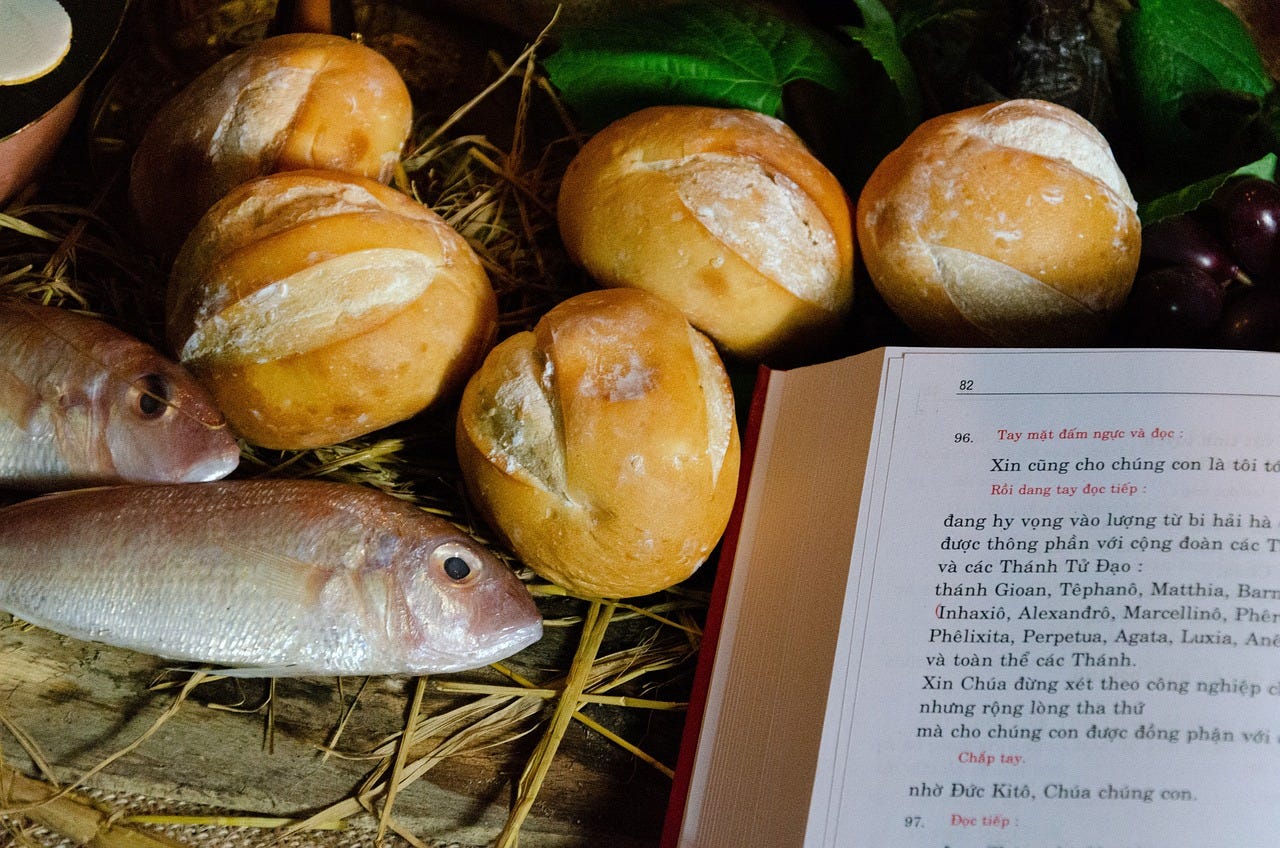Some years ago, John and I watched a movie called Millions. There was a lot to like in this movie. One of the really enjoyable things was that in the midst of this charming tale of a seven-year-old boy accidentally intersecting with the theft of millions, saints walked the earth.
They were presented completely straight. Only the boy could see them, but that didn’t mean they weren’t real. The touch of supernatural was utterly delightful This might have become one of my favorite movies, except…right in the midst of this movie that asked for such a leap of faith, whoever wrote it felt they had to pause for a suckerpunch.
After getting us to accept that miracles might happen, and saints might walk the earth, they had to stop to suggest that the miracle of the loaves and fishes…never happened.
After that, I found out there is a whole school of thought that thinks this way: Jesus healed the sick, raised the dead, and walked on the water. But when it came time to feed the multitudes—oh, that wasn’t a miracle. He just convinced the people there to share with each other.
Oh, that’s the real miracle, deary. People showing kindness to each other.
…
They had been there three days. He is worried because they had nothing to eat. He says they might faint.
But they had so much food hidden away that they just hadn’t gotten around to eating yet—after three days—that there was 12 baskets full left at the end.
Really?
Really?
One has to wonder, if he was not going to perform a miracle, couldn’t he have just prayed, and they would not have fainted? You know: “Father, I thank thee that thou hast heard me. And I knew that thou hearest me always: but because of the people which stand by I said it, that they may believe that thou hast sent me…please make sure everyone who listened to me gets home safely.”
But he didn’t do that.
So I thought it might be nice to look at these miracles—look at the evidence as it appears in the Bible—to see if there is any argument for “and he got everyone to pull out their hidden food and share, like a Biblical version of Stone Soup” verse he took a few loaves and fishes and made of them enough to feed several thousand (plus women and children) and have twelve baskets left over.
(Before we start, let us dispense with the argument “You cannot use the Bible for evidence.” If you don’t believe the Bible, you don’t believe the event of Jesus feeding several thousand people took place at all, in which this discussion has no bearing upon you. Okay. That’s out of the way. Back to examining the Biblical evidence.)
First Piece of Evidence: Can God multiply food? Hmm, let’s see:
8 ¶ And the word of the LORD came unto him, saying,
9 Arise, get thee to Zarephath, which belongeth to Zidon, and dwell there: behold, I have commanded a widow woman there to sustain thee.
10 So he arose and went to Zarephath. And when he came to the gate of the city, behold, the widow woman was there gathering of sticks: and he called to her, and said, Fetch me, I pray thee, a little water in a vessel, that I may drink.
11 And as she was going to fetch it, he called to her, and said, Bring me, I pray thee, a morsel of bread in thine hand.
12 And she said, As the LORD thy God liveth, I have not a cake, but an handful of meal in a barrel, and a little oil in a cruse: and, behold, I am gathering two sticks, that I may go in and dress it for me and my son, that we may eat it, and die.
13 And Elijah said unto her, Fear not; go and do as thou hast said: but make me thereof a little cake first, and bring it unto me, and after make for thee and for thy son.
14 For thus saith the LORD God of Israel, The barrel of meal shall not waste, neither shall the cruse of oil fail, until the day that the LORD sendeth rain upon the earth.
15 And she went and did according to the saying of Elijah: and she, and he, and her house, did eat many days.
16 And the barrel of meal wasted not, neither did the cruse of oil fail, according to the word of the LORD, which he spake by Elijah.
(I Kings 17:8–16)
So in the day of Elijah, during a drought, God made a barrel of meal and cruse of oil last far beyond any human expectation (considering that it was nearly empty when Elijah arrived.
This, clearly, cannot be explained by “and the people all shared. How sweet.”
Second Piece of Evidence: Hmm. That’s only one example. Has it ever happened any other time:
1 Now there cried a certain woman of the wives of the sons of the prophets unto Elisha, saying, Thy servant my husband is dead; and thou knowest that thy servant did fear the LORD: and the creditor is come to take unto him my two sons to be bondmen.
2 And Elisha said unto her, What shall I do for thee? tell me, what hast thou in the house? And she said, Thine handmaid hath not any thing in the house, save a pot of oil.
3 Then he said, Go, borrow thee vessels abroad of all thy neighbours, even empty vessels; borrow not a few.
4 And when thou art come in, thou shalt shut the door upon thee and upon thy sons, and shalt pour out into all those vessels, and thou shalt set aside that which is full.
5 So she went from him, and shut the door upon her and upon her sons, who brought the vessels to her; and she poured out.
6 And it came to pass, when the vessels were full, that she said unto her son, Bring me yet a vessel. And he said unto her, There is not a vessel more. And the oil stayed.
7 Then she came and told the man of God. And he said, Go, sell the oil, and pay thy debt, and live thou and thy children of the rest.
(II Kings 4:1–7)
Okay, so that’s twice now. This time, one pot of oil poured out enough to fill many, many vessels.
Again, in this case, the “and they all shared” hypothesis?—complete fail
Third Piece of Evidence: Let’s examine what we know happened:
14 And Jesus went forth, and saw a great multitude, and was moved with compassion toward them, and he healed their sick.
15 ¶ And when it was evening, his disciples came to him, saying, This is a desert place, and the time is now past; send the multitude away, that they may go into the villages, and buy themselves victuals.
16 But Jesus said unto them, They need not depart; give ye them to eat.
17 And they say unto him, We have here but five loaves, and two fishes.
18 He said, Bring them hither to me.
19 And he commanded the multitude to sit down on the grass, and took the five loaves, and the two fishes, and looking up to heaven, he blessed, and brake, and gave the loaves to his disciples, and the disciples to the multitude.
20 And they did all eat, and were filled: and they took up of the fragments that remained twelve baskets full.
21 And they that had eaten were about five thousand men, beside women and children.
(Matthew 14:14–21)
Fourth Piece of Evidence: Did it happen any other time?
32 ¶ Then Jesus called his disciples unto him, and said, I have compassion on the multitude, because they continue with me now three days, and have nothing to eat: and I will not send them away fasting, lest they faint in the way.
33 And his disciples say unto him, Whence should we have so much bread in the wilderness, as to fill so great a multitude?
34 And Jesus saith unto them, How many loaves have ye? And they said, Seven, and a few little fishes.
35 And he commanded the multitude to sit down on the ground.
36 And he took the seven loaves and the fishes, and gave thanks, and brake them, and gave to his disciples, and the disciples to the multitude.
37 And they did all eat, and were filled: and they took up of the broken meat that was left seven baskets full.
38 And they that did eat were four thousand men, beside women and children.
(Matthew 15:32–38)
“Whoa, Nelly! you might be thinking, “That’s just the same story twice, right?”
Fifth Piece of Evidence: Apparently not, because in the very next chapter of Matthew, Jesus says:
5 And when his disciples were come to the other side, they had forgotten to take bread.
6 ¶ Then Jesus said unto them, Take heed and beware of the leaven of the Pharisees and of the Sadducees.
7 And they reasoned among themselves, saying, It is because we have taken no bread.
8 Which when Jesus perceived, he said unto them, O ye of little faith, why reason ye among yourselves, because ye have brought no bread?
9 Do ye not yet understand, neither remember the five loaves of the five thousand, and how many baskets ye took up?
10 Neither the seven loaves of the four thousand, and how many baskets ye took up?
11 How is it that ye do not understand that I spake it not to you concerning bread, that ye should beware of the leaven of the Pharisees and of the Sadducees?
(Matthew 16:5–11)
According to the text, then, Jesus Himself believes that this happened twice—and that there were baskets of food left afterwards. And he uses it as an example of why they should not assume that he would chide them for not having enough bread on hand.
This does not seem like something you would say if you just happened to have convinced those guys, over there in that place, to share the food they were hoarding—when they were so hungry they were about to faint.
Sixth Piece of Evidence: Finally, we come to the thing that I, personally, find the most convincing of all.
24 When the people therefore saw that Jesus was not there, neither his disciples, they also took shipping, and came to Capernaum, seeking for Jesus.
25 And when they had found him on the other side of the sea, they said unto him, Rabbi, when camest thou hither?
26 Jesus answered them and said, Verily, verily, I say unto you, Ye seek me, not because ye saw the miracles, but because ye did eat of the loaves, and were filled.
27 Labour not for the meat which perisheth, but for that meat which endureth unto everlasting life, which the Son of man shall give unto you: for him hath God the Father sealed.
(John 6:24–27)
Why would they seek after him, traveling long distances at their own expense, if all he did was convince them to share the food they had with each other?
Couldn’t they have just stayed home and shared it?
Looking over all this, I draw the following conclusions:
The Bible had already established before Jesus’s period that God could multiply food.
Jesus uses the multiplying of the loaves as an example of why his disciples should not fret over not having bought bread.
The people follow Jesus hoping he’ll feed them again.
Final Piece of Evidence: This is not from the Bible:
A gentleman at my church once told me a story of how he had been stranded in the mountains on empty. He prayed, and he managed to drive all the way home, many, many miles. He knew it was a miracle. He was a man who prayed and helped heal others for a living, and he still found this event so miraculous that he would hardly talk about it.
But it had happened.
Conclusion: It seems to me that you can claim you do not believe the Bible at all. But if you do believe the Bible, if you believe in healing the sick, in Saints, in walking on water, there is no Biblical argument for doubting that God—who made the entire world—can multiply a small part of it.
And if He can do it in Elijah’s day and Elisha’s day and Jesus’s day, He can do it now as well—filling your larders or your pockets or your bank accounts, even when inflation seems through the roof and the economy teetering on an edge.
So rejoice and be exceedingly glad, for great are the blessings that He showers upon you.









Was listening to a Orthodox podcast and they pointed out an obvious note I hadn't thought of, but this and the resurrection are the only miracles of Jesus reported in all 4 gospels.
Why?
Because a running motif throughout the Bible, from Genesis to Exodus to the Gospels is this: God feeds His people.
Excellent points! I had heard the suggestion of the miracle of the feeding of the 5000 being a sort of spontaneous showing of good will but had heard it from a Jesus Seminar sort of corner and ignored it as bad Theology. Thanks for examining this more thoroughly. It brought to mind the manna in the desert as well.